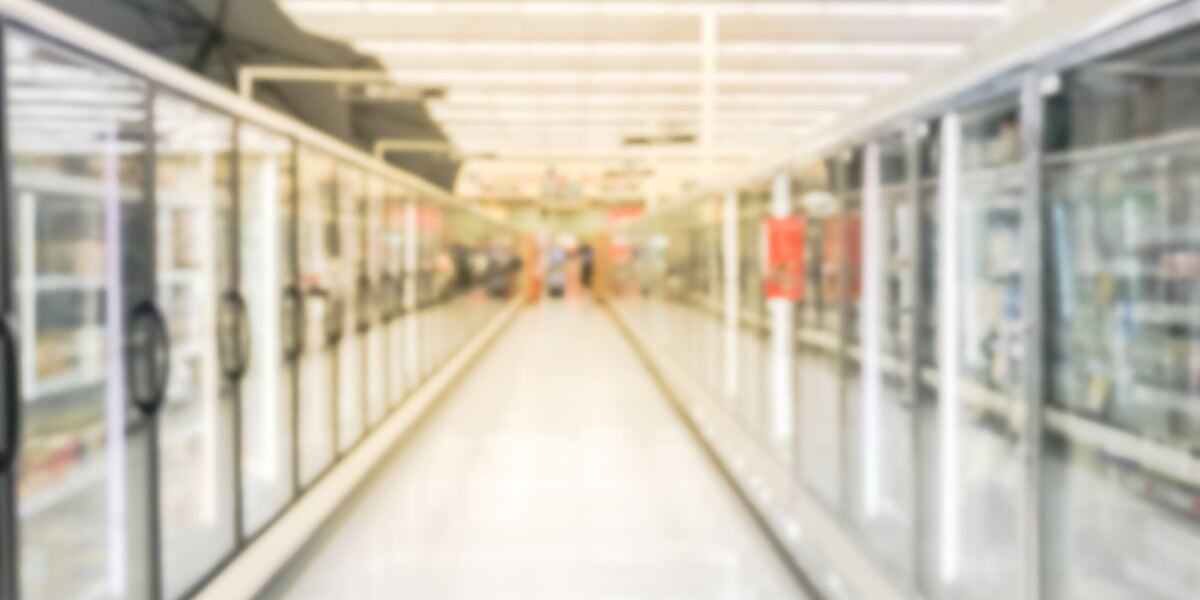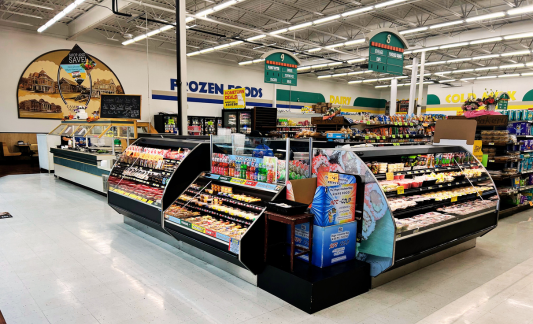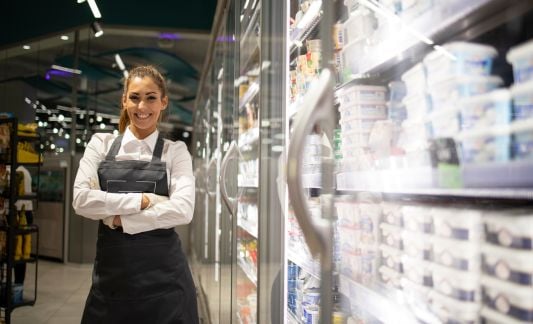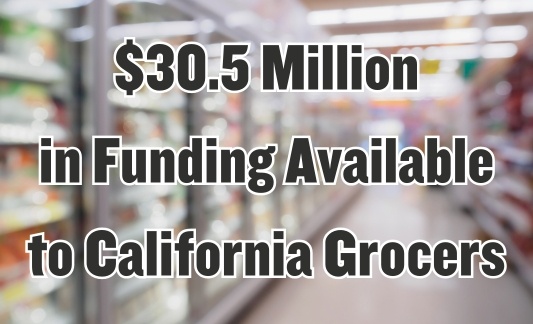Help Isom IGA recover from devasting floods

There is $1.9 billion in funding waiting to be used by rural grocers, but only a month and a half to apply for it. What are you waiting for?
Independent grocers in rural areas may qualify for the Rural Energy for America Program (REAP), a funding opportunity that can provide loan financing and grant funding to rural small businesses for renewable energy systems or to make energy efficiency improvements.
The catch? The application can take some time to submit, and the last round of applications must be submitted by September 30, 2024 for consideration. The later you wait, the less likely an eligible store is to receive the funding because it may already be distributed to qualified stores who submitted applications earlier.
IGA members are often great candidates for the funding.
"Ratio Institute has only asked for $11 million out of the almost $2 billion for rural grocers the USDA has available for efficiency upgrades," Peter Cooke, co-founder of Ratio Institute, a non-profit that works with over 1,000 grocery stores and chains to create store-level and enterprise sustainability solutions, said.
If you're planning to remodel or retrofit any appliances in your store in the next 36 months, install solar or other renewable energy, adhere to HFC refrigerant legislation, or simply want to reduce costs through energy efficient operations, keep reading.
Quick To Do List:
- Complete Ratio Institute's benchmarking survey to determine where your store is consuming the most energy.
- Decide if Ratio Institute will also complete the application for your store(s) and if so, notify them.
- Questions? Access the webinar with IGA CEO John Ross and Ratio Institute Co-founder Peter Cooke
"This is one of the single-best opportunities for rural grocers to upgrade their stores and impact their operations. There are opportunities to address future refrigerant requirements, improve operations, and improve profit," Ratio Institute Co-founder Jonathan Tan said.
Why apply for REAP funding now?
1. September 30 Final Deadline for 2024
There is only one more application submittal opportunity this year:
- September 30, 2024
Any application submitted earlier this year that was not granted will be reviewed again on September 30, along with any new submissions. The earlier a store completes and submits an application, the higher the probability the project gets funded.
2. HFC Regulations
Phasing out hydrofluorocarbons (HFCs) is part of the EPA's impending legislation that is already taking effect in states like California, New York, Vermont, and Washington. The cost of switching to an HFC-free cooling system will only go up as the deadline nears, so experts recommend taking energy efficient steps, like putting doors on open display cases, now. Taking advantage of utility rebates and grant funding can help reduce the cost of compliance significantly.
3. Energy Efficient Upgrades
Many equipment or energy upgrades may be covered through REAP funding, provided the needs are outlined appropriately in the application. For example, Geissler's Supermarkets worked closely with Ratio Institute on compressor upgrades.
"If you are planning to take any energy efficiency measures on your rack systems or compressors, a gas changeover is needed," Geissler's Supermarkets President Bob Rybick said, adding that including that gas changeover need as part of the comprehensive energy efficiency effort helped secure funding. "We were successful and awarded on that basis. Ratio Institute helped us identify and apply correctly."
What common projects can grocers complete with this funding?
Common projects include refrigeration system upgrades, lighting upgrades, HVAC upgrades, and solar projects.
"Funds can be used for any project where an energy reduction can be substantiated or for renewable energy projects, which is why we recommend considering REAP if you plan any remodel or retrofit in next 36 months," Tan said. "Thus, upgrading refrigeration systems, refrigerants, and equipment can not only reduce operational costs, but it can help address pending action from the AIM Act (2020), which orders the production of HFCs to be phased down 79% by 2029 and 85% by 2036."
What are the eligibility requirements and tips to apply?
The basic eligibility requirements are:
- Your store must be in an eligible area per the USDA map
- The project can provide a reduction in energy consumption or generates renewable energy (such as solar)
- Your business must be an SBA
Tan recommends grocers apply for the maximum funding and ensure eligibility before spending.
How many independent retailers have applied and what percentage do you anticipate will be approved?
As of the last deadline (June 30, 2024), Ratio Institute has submitted 21 applications for independent retailers. But IGA's competitors are submitting more than IGA members, Cooke noted, and there is plenty of funding available to IGA stores, many of which are eligible.
As noted above, Cooke said grocery stores have only asked for $11 million out of the almost $2 billion the USDA has available for efficiency upgrades.
Ratio Institute has secured over $2.2 million in grant funding on over $4 million in projects for IGA retailers, Cooke said, adding that the average grant awarded to each grocery store is $316,000.
All projects moving forward will be state dependent, scope dependent, and based on when an application is submitted. In general, we expect a probability greater than 50% of being funded.
In short, there is money available and the USDA wants to give it to rural grocers to help make their stores more energy efficient. With the impending regulations coming, there's no reason not to apply.
What other advice do you have for IGA members?
- Apply for as much money as possible. Retailers do not have to accept all funds granted. Once approved, more money cannot be added to the funding request.
- If you have already started a project, we can apply for funding for any portion of a project where monies have not been paid to vendors or contractors. For example, if you have a $1 million project and already made a downpayment $250,000, we can apply for grant monies on the balance of $750,000 of the project.
- You must wait to receive an accepted application letter before spending money to ensure all portions of the project are eligible for grant monies.
What are the steps to determining eligibility and applying for REAP?
The first step to is to determine your store's eligibility. The REAP grant is for stores in communities of less than 50,000 people, so plug in your store address to the USDA-eligible rural area map here. You should have less than 500 employees and less than $40 million in annual revenue per store location.
If your store is eligible, the next step is to complete an energy audit. As IGA’s sustainability partner, Ratio Institute can do that at a reduced cost for Independent Grocers Alliance members ($500 invoiced by IGA). They will identify where your store is consuming the most energy and propose solutions to solve them. Complete the benchmarking survey, which takes about 15 minutes, and provide us with a minimum of 12 months’ worth of the following bills:
- Electric bills
- Gas (heating) bills
- Water and sewer bills
- All solid waste and recycling bills or credits
- Any other municipal services bills
After Ratio Institute receives the assessment and bills, we will calculate:
- Realized savings: value in dollars and avoided greenhouse gas (GHG) of existing in-place items
- Potential savings: value in dollars and GHG of process and/or upgrades to employ or deploy
- Best practices: value of additional technologies and refrigerant improvements in dollars and GHG
- Operational comparisons: how your store compares to a typical store of your size, plus other insights and recommendations based on these metrics
Once the energy audit is complete, you can deliver it to your contractor to estimate a quote for recommended services. Ratio Institute can assist in the Scope of Work (SOW) development and consult with your contractor/vendor as part of the process to create the best project specific to each retailer's needs.
Finally, you will submit the energy audit and scope to the USDA via the application. Alternatively, Ratio Institute can submit the grant application on your behalf (Ratio Institute charges $1,000 for this service, which covers the $500 for the report and $500 for the initial application, plus 10% of the project costs based only on grant approval).
Questions? Contact us via this form. Ready to get started? Click here to start the energy assessment with Ratio Institute.
Previous Story
← Labor Retention Strategies for Independent Grocers
You May Also Like
These Stories on Sustainability
Apr 8, 2025 10:22:29 AM |
5 min read
Oct 17, 2024 9:13:18 AM |
2 min read



No Comments Yet
Let us know what you think